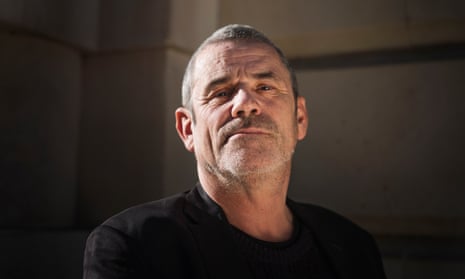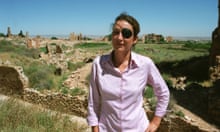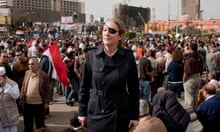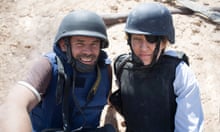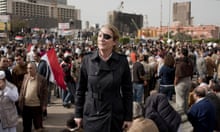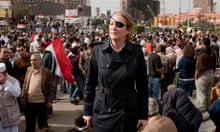Paul Conroy is elated. When we meet, the news has just broken that a court in Washington DC has ruled that the Syrian regime of Bashar al-Assad is liable for the killing of the Sunday Times correspondent Marie Colvin and the French photojournalist Rémi Ochlik in a rebel-held enclave of Homs in February 2012. Conroy, who was the Sunday Times photographer working with Colvin in Syria, was seriously injured in the rocket attack that killed her, and he has spent the past seven years trying to prove they were deliberately targeted. Today is vindication.
“My opinion was always that the attack wasn’t an accidental crossfire job,” he tells me. “By the nature of the artillery bombardment, the ‘bracketing’ pattern was obvious.” He knows what he’s talking about because, before becoming a photographer, he was a gunner in the army, serving with the Royal Artillery in the 1980s. On the morning of the attack in Homs, he realised rockets were exploding at precise distances on either side of the building in which they were based. The Syrian gunners were pinpointing their target; “walking in” the bombs, to use the army jargon.
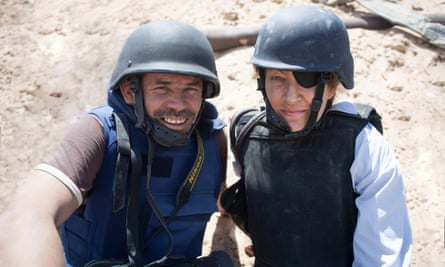
Conroy predicted the exact moment when the makeshift media centre would be hit. “I knew what was going to happen and 30 seconds later the building started disintegrating around us,” he says. Colvin and Ochlik took a direct hit as they ran across the street to try to escape and were killed instantly. Conroy stayed, reasoning that the building would offer some protection from the blast. His leg was torn apart by shrapnel, but he lived to tell the tale. Telling it has become his life’s work.
The court in Washington awarded $300m in punitive damages against the Assad regime, though Conroy realises the cheque will not be in the post any time soon. “No one has ever thought Assad is going to give himself up,” he says. “What the judgment does do, however, is give us a list of 10 people at the top who we can now point to as having been convicted, and we can ask: are these people we should be doing business with?” He says the slow reintegration of Assad back into international political life is an insult not just to Colvin and Ochlik, but to a million dead Syrians.
Conroy, 54, considers himself still to be on the assignment that took him and Colvin to the bombed-out district of Baba Amr in the south-west of Homs. Soon after Colvin’s death and despite his injuries, which necessitated 14 operations, he wrote a book called Under the Wire about his work with her in Libya in 2011 and in Syria in 2012. His account was the basis of an acclaimed documentary released last September. Now comes a feature film called A Private War focusing on Colvin’s driven personality, which combined professional triumphs over three decades with personal battles against alcoholism and depression.
Rosamund Pike gives a powerful performance as Colvin; the earthy, Liverpool-born Conroy is played by Jamie Dornan, who captures his heroism and sound judgment but perhaps misses some of the black humour. Along with booze and cigarettes, it was that humour that fuelled his journalistic relationship with Colvin. Inside the Hollywoodesque drama and moralising of A Private War is a madcap British movie trying to escape – a story of adventure and danger, laughter and sadness, hysteria and sharp-eyed sympathy that ends in sudden catastrophe; a blank screen at the end of a bravura Technicolor performance.
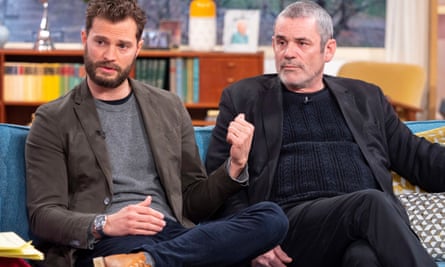
The book and the films – he is credited as a consultant on A Private War – have taken over Conroy’s life, and he no longer works as a photographer. “When I escaped from Homs [six days after the attack that killed Colvin], a lot of people put a lot of effort into getting me out. We were in a tunnel on the first leg of the escape, and there were women and kids there. Being British I can’t go before them, and there was a bit of a stand-off. But they said to me: ‘Your friends are dead, our friends are dead, their families are dead, most people are dead, the world isn’t listening; if you get out, tell our story.’ I made a promise to tell their story, and I take that seriously.”
He says A Private War will take that story to an audience that wouldn’t have been exposed to the book or the documentary, and believes it does justice to Colvin’s memory. “Marie was a real person to me, and Ros [Pike] captures her perfectly.” The bloodymindedness; the gravelly American voice – Colvin was born in New York and grew up on Long Island; that famous eyepatch – she lost the sight in her left eye in a grenade attack in Sri Lanka in 2001. It is a convincing portrait that doesn’t shy away from Colvin’s messy personal life, with its failed marriages and self-destructive passages.

Conroy dismisses the canard that Colvin was an “adrenaline junkie” hooked on war. “People call her fearless,” he says, “but they are absolutely wrong. She was terrified. Her bravery came from going back in even though she was terrified. That’s completely different from being fearless. It was just that curiosity overtook any sense of staying alive.” He also rejects the notion that, having seen colleagues such as the reporter David Blundy and the photojournalist Tim Hetherington killed covering wars, she had some kind of death wish. “You don’t go in with that in your head,” he says. “If anything it will always be somebody else. You’ve got to believe that. You’re right to be scared, but if I started to think ‘this is my last trip’, I wouldn’t go.”
He defends the Sunday Times against accusations that it shouldn’t have sent Colvin, who was 56 and had suffered from PTSD, to Syria. “No one can blame the paper,” he says. “I really dislike people saying they shouldn’t have sent us. They didn’t send us. We were banging on their door. We pushed and pushed to get into Syria. No one was to blame. She knew what we were getting into.”
The irony is that it was only in war zones that Colvin, despite the fear, felt secure. She was focused, the drinking was under control, the complicated love affairs were forgotten, the story took over. “It’s what we do,” she said laconically to people who raised the risks she was taking by going into Baba Amr. Chasing the story is what killed her, but it was also what had given her life.
A Private War goes on general release in the UK on 15 February. A Q&A with Rosamund Pike, Jamie Dornan, Paul Conroy and Matthew Heineman will be broadcast live to cinemas on 4 February. Book tickets at https://aprivatewar.film/
Under the Wire will be shown on BBC Four at 10pm on 11 February.
